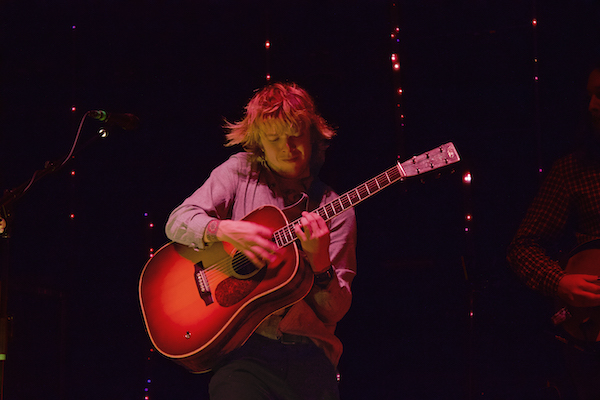Concert Review: Billy Strings — “A Big Ball in Boston”
By Scott McLennan
Once again, Billy Strings pulled an exhilarating assemblage of musical influences under a big tent.

Billy Strings at the Boch Center Wang Theatre. Photo: Sam McLennan
Billy Strings does his homework, placing songs in his concerts that nod to the show’s locale or pay tribute to an artist or an event relevant to the time and place of the performance.
So, heading into Strings’s sold-out show Wednesday at the Boch Center Wang Theatre, the mind reeled with possibilities: Would Billy do a bluegrass version of Aerosmith’s “Toys in the Attic”? Would he turn Boston’s “More Than a Feeling” into a high lonesome ballad? Would Peter Wolf materialize (as is his wont at any big show in town) for a mandolin-banjo-guitar-bass breakdown of J. Geils Band’s “Detroit Breakdown”?
Nope, none of the above. Instead, guitar virtuoso Strings and his impeccable and high-flying band — mandolin player Jarrod Walker, bassist Royal Masat, and banjo player Billy Failing — served up the traditional instrumental tune “Boston Boy,” popularized by modern mandolin master David Grisman. It was a logical choice to be one of the numbers in the band’s hour-long first set, which tipped toward this group’s purer bluegrass roots.
Strings and crew opened with the wail of “Red Daisy,” a song off the guitarist’s new album Renewal, a tune whose style resonates with what could have been written in any earlier era of bluegrass. The band stuck to traditional quick picking and rapid-fire transitions with a version of Billy Hayes’s “I’ll Remember You Love in My Prayers.”
Strings then moved the show to contemporary turf, starting with his original instrumental “Bronzeback,” which functions like a speed-demon Van Halen number performed only on acoustic instruments. “Must Be Seven” and “Fire Line” showcased Strings’s songwriting chops. Each tune’s thought-provoking lyrics were handled with meticulous musical prowess.
The remainder of the first set followed this playbook, alternating traditional numbers (with a very pretty “Peggy-O” in the mix) with originals whose contemporary sensibilities generate larger audiences than you typically see at a bluegrass show. It culminated with the explosive set-closer “Meet Me at the Creek,” during which Strings and his bandmates ventured to the outer limits of psychedelia before returning to the country tune’s conventional landscape. There were points in the lengthy excursion taken by “Creek” where Strings looked downright feral, and others when he appeared to be glowing in rapture.
Strings and his band returned for a second hour-long set that served up bigger chunks of improvisational exploration. Its highlights were supplied by original material. Strings’s “Fire on My Tongue” from Renewal and “Taking Water” from the Grammy-winning Home opened the set with complementary swirls of despair (and a shared reliance on the imagery of ashes).
The first big jam section of the set flowed from “Taking Water” to the “End of the Rainbow,” another cover of a composition by a mandolin master, this time Frank Wakefield. Aptly, Walker generated his own mesmerizing mandolin solo on the song, with banjo player Failing also taking a fierce solo.
The jamming continued into Strings’s upbeat instrumental “Thirst Mutilator.” Without catching a breath, the band launched straight into “Dust in a Baggie,” Strings’s hangdog drug-bust tale that has grown into a celebratory acknowledgment that at some point we all screw up (and just hope the consequences don’t land us in the clink for 20 years).
Strings has made giant steps as an artist over the past year, so he has gotten to the point where he needs to start pruning his catalog. That was the impression left after the performance of “Highway Hypnosis,” a standard life-on-the-road rocker that has customarily served as a big jam vehicle. It wasn’t a problem hearing it on Wednesday, but Strings has better songs that probe a little deeper and still give the band a good opportunity to take off into lengthy instrumental jams and solos.

Billy Strings and band at the Boch Center Wang Theatre. Photo: Sam McLennan
Strings proved my point a few tunes later when he closed the set with an epic version of the Renewal track “Hide and Seek.” Before he got there, though, we got one last compelling contrast between influences. First, Strings delivered the woeful country ballad “John Deere Tractor,” a song central to the Strings origin story because it was the first song his father, musician Terry Barber, played on a prized guitar that he sold and that Billy later tracked down, bought, and returned to Barber. Then Strings and his band launched into Pearl Jam’s “In Hiding,” soaring on their acoustic instruments as high as the Seattle rockers ever did on their own song.
Once again, Strings pulled an exhilarating assemblage of musical influences under a big tent. His boundless energy was not dedicated to a particular sound or style, but to crafting an exhilarating experience out of seemingly disparate elements.
Strings’s final strategic choice was his encore tune — “Big Ball in Boston,” a traditional number performed by the Kingston Trio, Del McCoury, and others. It was an apt summation of that night’s show.
Scott McLennan covered music for the Worcester Telegram & Gazette from 1993 to 2008. He then contributed music reviews and features to the Boston Globe, Providence Journal, Portland Press Herald, and WGBH, as well as to the Arts Fuse. He also operated the NE Metal blog to provide in-depth coverage of the region’s heavy metal scene.

Another great piece from Scott.
I was at the show and thoroughly enjoyed his descriptive review
Thanks
!!